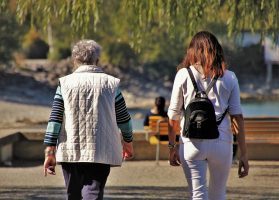Caring for your loved one with early-stage Alzheimer’s

Alzheimer’s is a progressive disease.
And so it is marked clearly by different characteristic stages.
And as a matter of fact, while there is still no promising cure for the disease, early diagnosis helps the affected to live a more productive life than a later diagnosis.
In this post, I will be sharing 3 tips on caring for your loved one with early-stage Alzheimer’s Disease.
Caring for your loved one with early-stage Alzheimer’s
Most people during the early stages of Alzheimer’s can still do a lot.
They will most likely still be able to work, be involved in social activities and perform activities they have always performed.
However, you might notice that they tend to forget where they have placed items or names of people they shouldn’t be forgetting.
Damage to brain cells will cause a person to forget how to perform certain tasks which might leave them frustrated and angry.
Though these symptoms are subtle, they usually suggest that something is going on.
At this point, it is best to talk to your loved one about going to see a doctor for a check-up.
Tips for broaching the subject
- Tell them that you are concerned and that you would love them to see a doctor with you. Don’t force them. But do harp on the fact that it will be a helpful exercise.
- Be patient with them. Losing your autonomy is difficult and people going through it will be frustrated. Empathize and let them know that you are there for them.
Once you have confirmed with a specialist that Alzheimer’s Disease is in play, here is what you can do.
8 tips for caring for your loved one after early-stage diagnosis
- Help your loved one stay independent for as long as possible. For instance, it is likely they can still dress themselves up. Let them do it for as long as possible. This will give them a sense of well-being and control.
- As much as possible, include them in every decision-making process. Make sure you involve your loved one in whatever decision you make. Even though they may seem confused by the details sometimes, including them in the conversation will provide them with a sense of control.
- An early diagnosis means you and your loved one can still plan the future together. This is a good time to talk about wills, advance directives and finances.
- Put safety measures in place around the home. Here are 21 actions you can take to keep your loved one safe at home.
- Remember to be patient and supportive. Remind them of what day it is or which grandchild it is who is visiting. It is important to be supportive and patient during this period. Depression is common with Alzheimer’s. And so if your loved one feels they are being ignored or mistreated because their condition, it could exacerbate those feelings.
- Dealing with a loved one who is particularly difficult? Read this post I wrote on navigating difficult relationships.
- Take care of yourself as a caregiver. Taking care of a loved one with Alzheimer’s Disease is not easy for anyone. You might go through the stages of grief. Talk to a counselor or mental health professional. If you have a large family network, this is a good time for the family to come together to support. Your needs are important too. Make sure you are caring for yourself so you can provide the best care for your loved one.
- Hire professional help as needed. If you live in the Greater San Diego area or in Orange County, GreenTree Home Care is more than happy to help you find the professional caregivers you need for your loved one.
